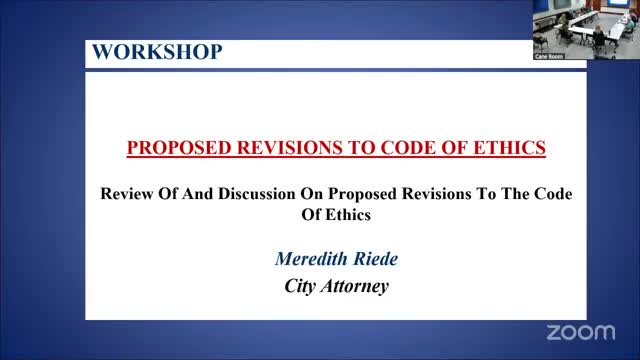Sugar Land ethics board debates stronger sanctions, considers up to $5,000 fine and recovery of economic gains
Get AI-powered insights, summaries, and transcripts
Subscribe
Summary
During a workshop the board reviewed sample penalties from other cities, campaign finance reporting rules, and draft language that would allow fines up to $5,000 per violation and recovery of economic gains or sought benefits. Board members discussed deterrence, legal limits, and next steps to draft ordinance language for council review.
Board members spent substantial time reviewing draft sanctions language and examples from other cities, including San Francisco and Seattle, and debated how Sugar Land should structure penalties for ethics violations.
Members reviewed campaign finance and disclosure examples cited in packet materials and discussed the timing of filings, the 14-day amendment window after discovering an error, and differences between political committees and PACs under Texas election law. Meredith (staff member) summarized how campaign-committee reports are filed with the city secretary and noted state filing cadences that can trigger additional reporting around elections.
The largest portion of the workshop focused on monetary penalties and deterrence. Members considered several options drawn from other municipal codes: fixed fines per violation, fines tied to the economic value of gains sought or received, and reimbursement of city legal costs. Participants discussed city examples where fines ranged from a few hundred to six-figure settlements in large cities; members noted that some of those settlements later were reduced.
Board members expressed two consistent aims: (1) penalties must deter corruption, and (2) proposed sanctions must be implementable and defensible if the city council adopts them. Some members argued for a formula that would exceed the economic benefit (e.g., greater than 100%) so the act would not be economically profitable; others worried that overly prescriptive percentages would make approval by council harder to secure. Several members proposed flexible language allowing a fine of up to $5,000 per violation and/or an amount up to the total economic gains sought or received in violation.
The board also discussed recovery of reasonable legal costs when an adjudication results in a finding, and whether reimbursement should be capped to avoid exceeding an assessed monetary fine. Members noted enforcement limits: the board cannot unilaterally bar someone from running for office except where state law already disqualifies candidates (for example, convictions involving moral turpitude), so the remedy toolbox focuses on monetary penalties, reprimands, and recommendations to council or voters.
Direction to staff: the board asked staff to prepare draft ordinance language that would incorporate the workshop feedback — including a proposed clause for fines of up to $5,000 per violation and/or up to the economic value of gains sought or received, reimbursement language for legal costs, and clearer campaign-reporting amendment timelines — and to return the draft for the board’s next meeting and eventual referral to city council.
No final vote on ordinance language occurred at this meeting; members agreed to take the redrafted language forward for further review and possible council consideration.
